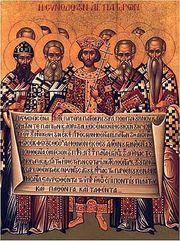The Edict of Milan – 313 AD – the “birth certificate for religious freedom”

The theme of the 20th Annual International Law and Religion Symposium – “Religion and Human Rights” – was chosen for its timeliness and urgency, and also in acknowledgment of the 1700th anniversary of the proclamation of the Edict of Milan, the 313 AD agreement between Roman Emperors of East and West that effectively granted religious freedom throughout the Roman Empire, marking what lawyer, politician, and professor Gabrio Lombardi has termed the Initium Libertatis, in effect the “birth certificate for religious freedom.”
In a certain sense, said Cardinal Angelo Scola, Archbishop of Milan, writing in December 2012, “the very first emergence in history of the two phenomena that today we call ‘religious freedom’ and ‘the secular state’ … two crucial elements of a good organisation of political society” may be traced back to this event.
This agreement and subsequent writings now known as the Edict of Milan arose from a meeting of two competing Roman Emperors, Constantine I, who controlled the Western part of the Roman Empire, and his brother-in-law Lincinus, who controlled the Balkans, and who, by defeating the Emperor Maximin, had recently come to control the provinces of the Eastern Empire. The two emperors met in Milan (Mediolanurn) in 313 AD and collaborated in creating a letter to Maximin:
We thought it fit to commend these things most fully to your care that you may know that we have given to those Christians free and unrestricted opportunity of religious worship. When you see that this has been granted to them by us, your Worship will know that we have also conceded to other religions the right of open and free observance of their worship for the sake of the peace of our times, that each one may have the free opportunity to worship as he pleases; this regulation is made we that we may not seem to detract from any dignity or any religion.
It is the mission of the International Center for Law and Religion Studies to help secure the blessings of freedom of religion and belief for all people through its academic work, including research and publications, network-buildiing, assisting in law reform processes, and organizing and particpating in dozens of conferences throughout the world each year, culminated in this Annual Law and Religion Symposium.